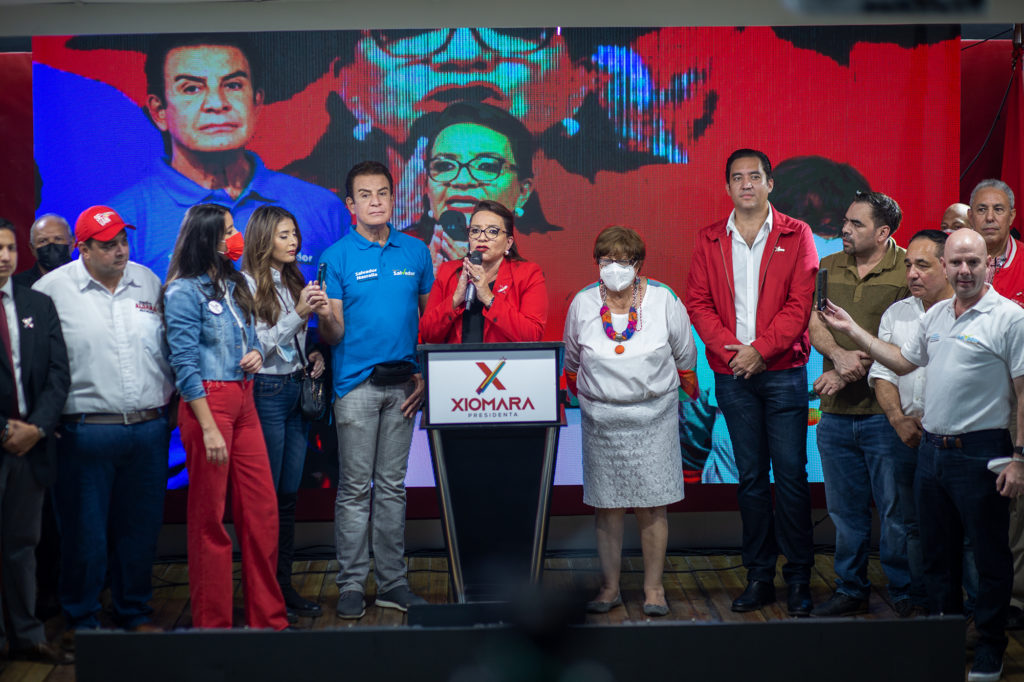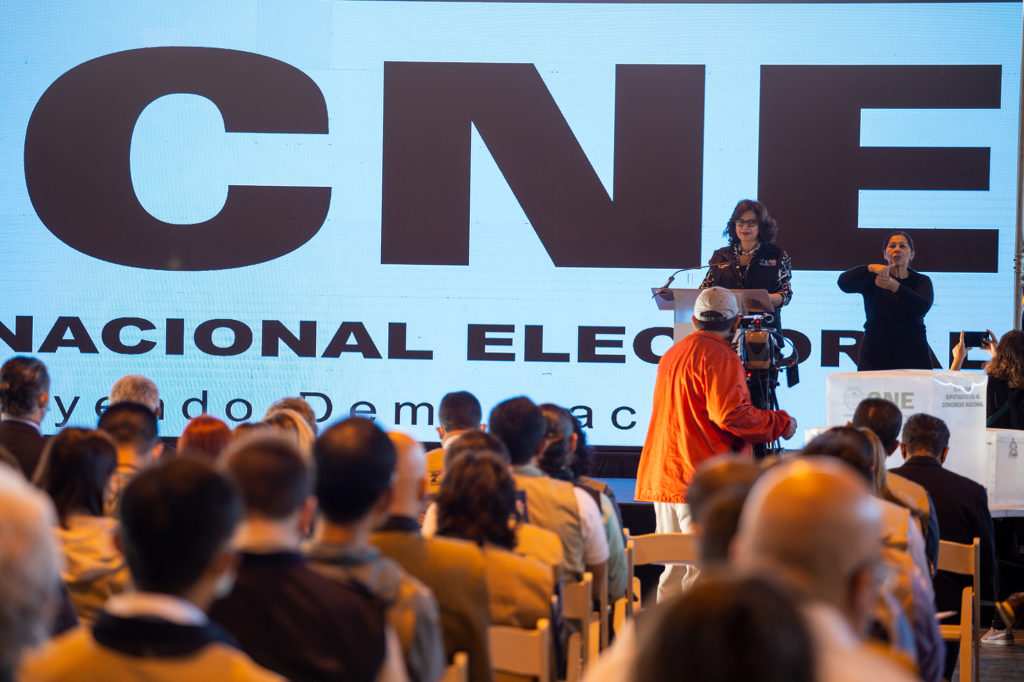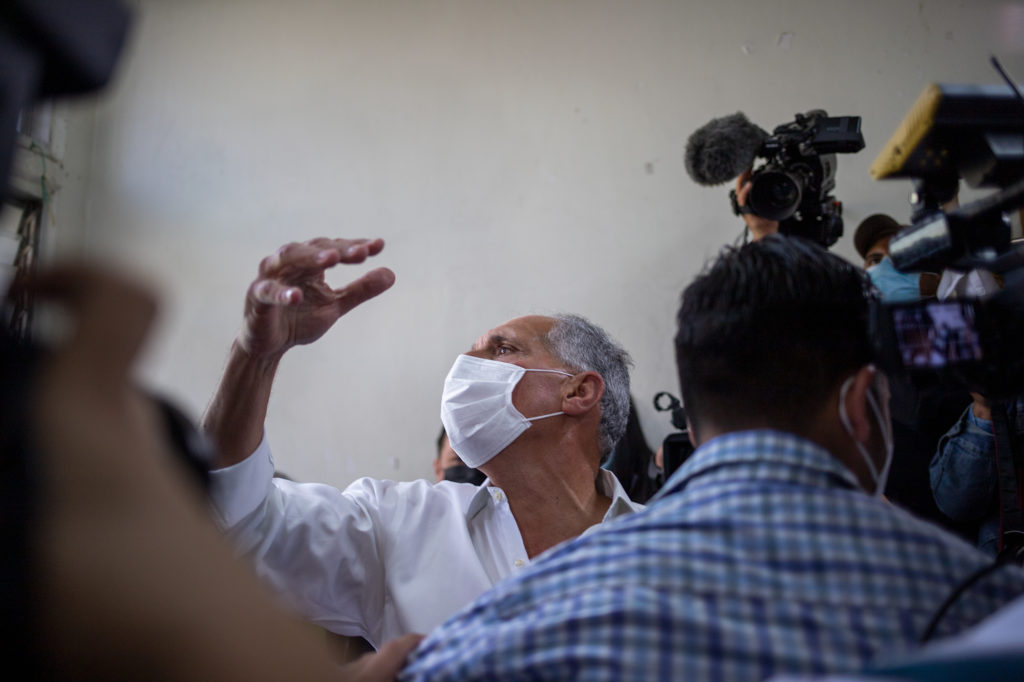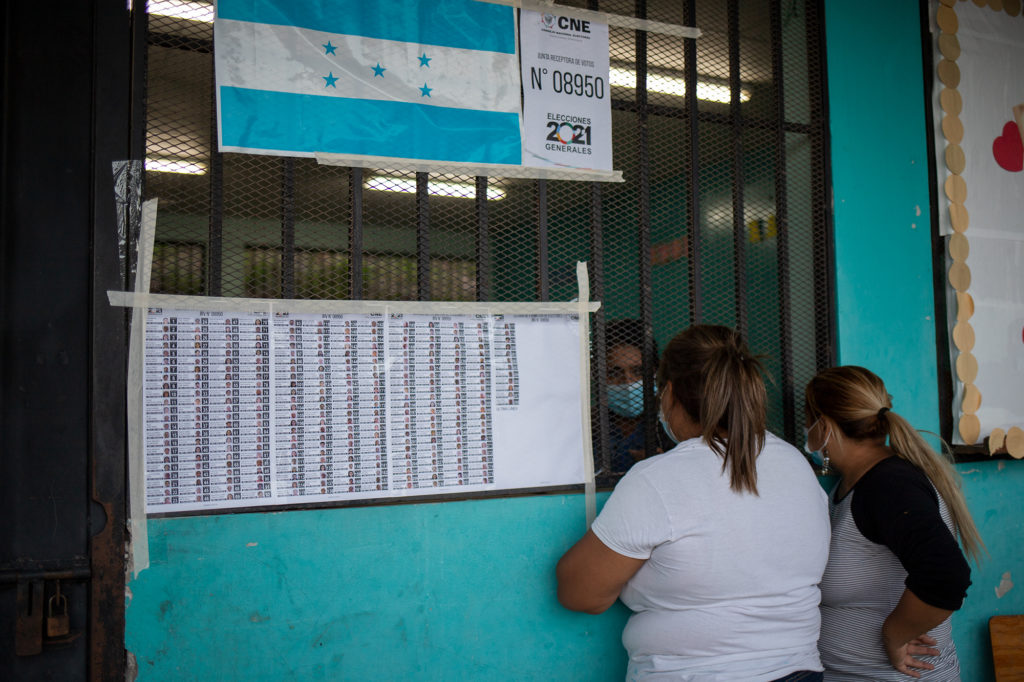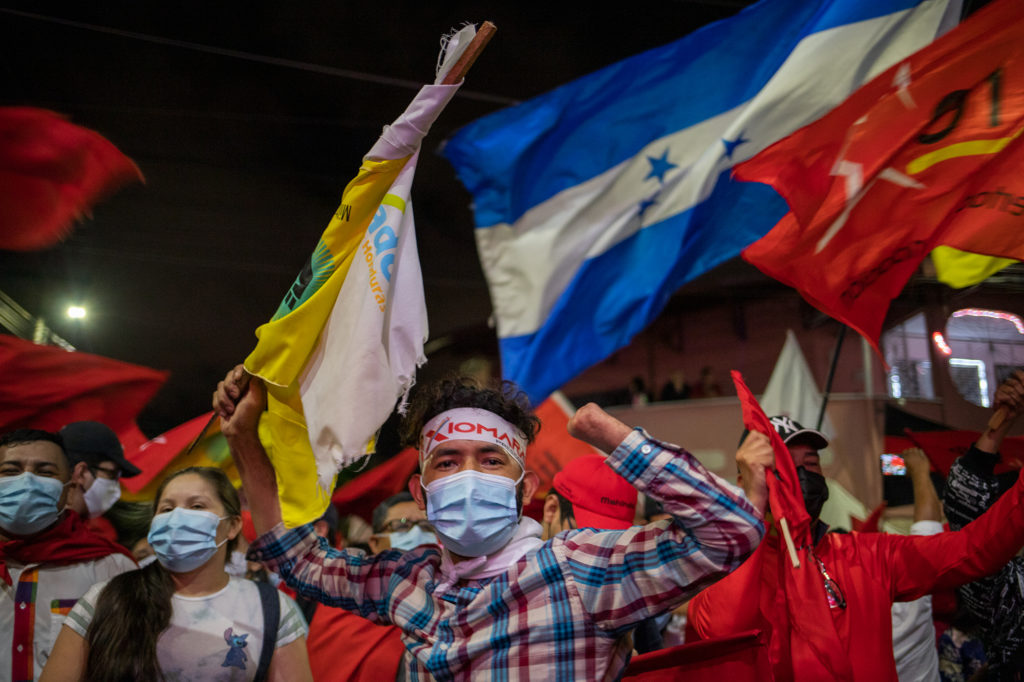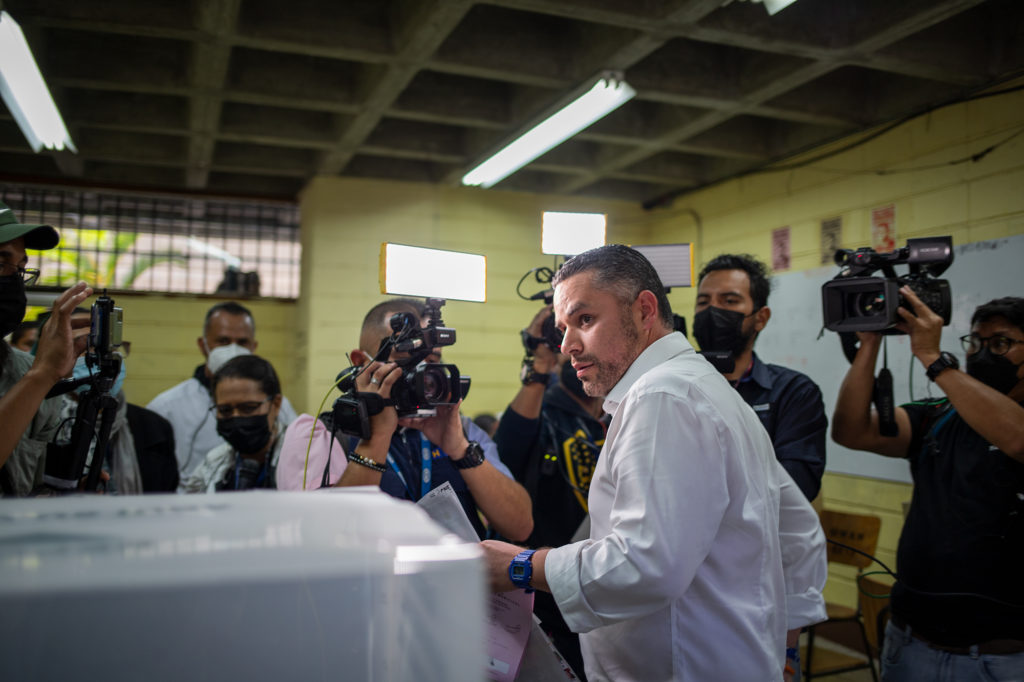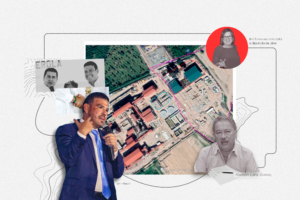A climate of uncertainty surrounded Sunday’s general election. But in the end, the day proceeded without violence and ended with the highest voter turnout in the last twelve years. Preliminary results gave Xiomara Castro of the Libre Party a wide lead. Though the country is still waiting for an official declaration, it seems Honduras will have its first female president and break with the two-party stranglehold on political power.
By Fernando Silva and Jennifer Avila
Photos by Martín Cálix
Election day in Tegucigalpa was like a typical Honduran party; happy but tense. From early in the day, songs could be heard referencing something that ultimately changed the outcome of the elections: a rejection of President Juan Orlando Hernández and his National Party. Citizens flocked to the voting centers to the sounds of merengue songs about Hernández’s downfall and possible prosecution in a U.S. court. Although Nasry Asfura was the National Party candidate, the songs were only about getting rid of Hernández.
Despite predictions of election-day strife, the National Party’s fear campaign, the character assassination of candidates, and the hazards of voting in crime-ridden neighborhoods, the Honduran people went with their families to the ballot boxes. At the end of the day, they took to the streets to celebrate the Libre Party’s wide margin of victory. With 51.45% of the votes tallied, the National Electoral Council (Consejo Nacional Electoral – CNE) estimated that 68.9% of the public turned out to vote.
Several new elements characterized the 2021 elections, the most important of which was the results transmission system. On September 28, the CNE awarded Magic Software Argentina (MSA) a contract to transmit the preliminary election results. MSA played a key role in these elections, yet never gained the support of the National Party who made baseless claims that MSA had submitted falsified documents to win the contract. During the 2017 elections, the results transmission system was down for more than six hours, producing much skepticism and leading to the election fraud that handed Hernández another term as president.
At 8:30 p.m, the CNE announced that Libre Party candidate Xiomara Castro had a nearly 20 percentage-point lead over National Party candidate Nasry Asfura. Soon after, groups of Libre Party activists swarmed their party headquarters to celebrate the victory with the president-elect. Meanwhile, the losing National Party remained conspicuously silent. Despite its efforts to distance itself from Juan Orlando Hernandez, the National Party was resoundingly rejected by the Honduran people.
José, a young Libre Party activist, says that only one thing still bothers him; Asfura’s silence about his defeat. The night before election day, José told us, “This is make-or-break for me. If they do what they did in 2017, I’m leaving the country.” His party has been the victim of fraud since 2013, says José, and he can’t forget what happened to him the day after the 2017 elections when he was attacked during a street demonstration that was demanding transparency in a fraudulent election.
Saturday midnight, the day before the election. José couldn’t sleep so he went to watch over the voting center. He told us that if the election was stolen again, he would have no choice but to “pack his bags and leave.” But a day later, there was no voter repression and no suspicious system failure. José now sees a more hopeful future for himself and his young son.
Technology concerns and distrust of the electoral process
CNE directors Kelvin Aguirre, Ana Paola Hall, and Rixi Moncada held a press conference in Tegucigalpa to solemnly kick off the election process with prayer, followed by a hastily improvised casting of the first vote. The members of the Vote Collection Board (Junta Receptora de Votos – JRV) were only advised thirty minutes earlier that they were required to participate in the election kick-off ceremony.
The first vote was cast at JRV #10520 in the Vicente Cáceres Institute, a large secondary school in the capital city. Six representatives of the political parties were present; one from the Liberal Party, two from the Libre Party, two from the National Party, and one from the Vamos Party. The young woman representing the Vamos Party could not remember the name of her own party’s presidential candidate.
The president of the JRV board presiding over Table #10520, Angelica María Zepeda, told us that her love for the National Party motivated her to serve in this capacity. She said that she works as a Family Guide in the Better Life (Vida Mejor) program run by the Ministry of Development and Social Inclusion (Secretaría de Desarrollo e Inclusión Social – SEDIS). This is one of the Hernandez administration’s flagship projects, which has distributed more than US$290 million to its beneficiaries over the last three years. Many National Party representatives working in the JRVs were part of the Better Life program.
Reiniery Amador, an employee of the Ministry of Foreign Affairs, cast the first vote, ninety minutes after the scheduled start time. Amador, who is also an election observer, said, “There’s always some way to commit fraud. Even the most secure banks have security systems that can be beaten.”
After David Chavez, the president of the National Party declared an early victory, Ebal Diaz, a candidate for Congress told Contracorriente that they [the National Party] did not trust the CNE’s system. “If they’re still sending out materials and equipment to transmit data at this late stage, many voting centers won’t have any way to transmit results,” said Diaz.
“The only thing the National Party can do is have our own transmission system. We have such a system, and we’re going to tell the media and the Honduran people how it was developed. The system is already set up for the National Party to operate, and we have a center to collect all the information we’re going to share,” he added. Ebal noted that the tally sheets from each voting center would ultimately reveal the will of the voters, “and their will is to elect Nasry Asfura.”
The National Party provided vehicles to transport its supporters to voting centers around the country and used several mobile apps to help people find their respective voting centers. Because of the party’s distrust of the CNE, these apps also recorded each user as a confirmed voter for National Party candidates.
Skepticism about the CNE grew when MSA was first contracted to transmit the preliminary election results and intensified when the transmission trial run failed a few weeks ago. Acknowledging this skepticism, CNE director Ana Paola Hall made public statements reminding the country that the current CNE is not the electoral council that was the main perpetrator of the 2017 election fraud, and that, “We must remember this difference in the coming days.”
One problem with delivering CNE resources to voting centers occurred in the Zapote Norte neighborhood of Comayagüela. As election day ended, the voting center was about to submit its paper tally sheets because the electronic transmission kit didn’t arrive until 6:45 p.m. The voting center for that gang-controlled neighborhood on the outskirts of Comayagüela was installed in the Ibrahím Gamero primary school. Throngs of voters arrived there early in the morning to cast their ballots, according to Sofia Vindel, the voting center custodian. National Party activists accosted Vindel as they tried to storm past the security measures imposed to prevent violence.
“When people come in, they’re a little afraid because sometimes party activists say that they’re going to take pictures and people are intimidated. I think their scare tactics cause violence when they’re confronted, which is what happened here this morning,” said Vindel.
Nonetheless, in his statement communicating the preliminary election results, the CNE’s Kelvin Aguirre noted that 68.09% of the eligible voters turned out for this election, significantly higher than the 57.49% that turned out in 2017. The large turnout was evident in every neighborhood of the capital city.
Preliminary results give rise to early celebrations
The CNE promised to release preliminary results at 8:00 pm, three hours after the polls closed on election day. The CNE began releasing preliminary results at 8:30 pm and provided its last update at 7:00 am on November 29. The first results showed Xiomara Castro with a nearly 20-point lead over her closest challenger, with 16% of the votes tallied.
These results turned the prospect of conflict and violence into a nationwide celebration. Even the media that usually supports the ruling party recognized the Libre Party’s victory. On November 29, Liberal Party candidate Yani Rosenthal Oliva held a press conference to say that his party was also celebrating, “because we’ve finally ended the right-wing nightmare.”
Honduran business and political leaders, and foreign leaders including Venezuelan President Nicolas Maduro have publicly congratulated Castro. As the night of November 28 wore on, Libre headquarters and Tegucigalpa’s main avenues took on a carnival atmosphere.
“Xiomara’s government will be as good as her husband’s, Mel Zelaya, which was one of the best governments in history,” said an activist as she waved a Libre flag and waited for Xiomara Castro’s speech. An hour later, Castro appeared and said that she would normalize holding people’s consultations, evoking her proposal to convene a National Constituent Assembly if she won office. She also pledged to form a government of national reconciliation.
Xiomara will be the first woman to become president of Honduras and her election also breaks with the traditional two-party stronghold on political power. Historian Otto Argueta says, “Between 1839 and 2021 (182 years) there were 116 changes of government, which included dictatorships, coups, military juntas, reelections, and conservative or liberal juntas. But this is the first time a political party besides the National or Liberal parties has won an election.”
Although the Libre Party was formed following a split within the Liberal Party after the 2009 coup, it now defines itself as a leftist party and has aligned with the Honduran social movements.
Raul Pineda, a lawyer, analyst, and former member of the National Party says it’s too soon to announce the extinction of the two-party system, because “whether we have two or four political parties, the system won’t change.” Pineda thinks that this is a natural evolution to accommodate new generations that couldn’t find a place in the traditional parties. Regarding the possibility of Manuel Zelaya seeking revenge for the coup that deposed him, Pineda says that this kind of persecution is unlikely and serves nobody’s interests. He does believe that legal proceedings to diminish impunity could happen.
In her press conference, Xiomara Castro promised to seek a national dialogue with all sectors to build a government of reconciliation that includes those who will soon become the political opposition.
The celebration of Libre’s triumph continued into the early hours of the morning, with chants of “They’re leaving!”─ the party’s campaign slogan. Others sang, “Juanchi’s going to New York,” referring to the possibility that Juan Orlando Hernández could face charges in the Southern District Court of New York for being a co-conspirator in drug trafficking.
The National Party planned its own election day celebration at its headquarters in one of the capital’s most exclusive facilities. Blue decorations and lively music gave off a party atmosphere, but the few party faithful who attended remained seated after congressional candidate and journalist Jorge Zelaya gave a speech announcing that the CNE website wasn’t working. “When the tally sheets are delivered here in the capital, they will show that the National Party has won again with Tito Asfura,” said Zelaya, referring to the preliminary results that only reflected 16% of the tally sheets. Yet less than 24 hours later, with 50% of the tally sheets processed, the momentum hadn’t swung in favor of the National Party, and their planned celebration never happened.
As of November 30, Nasry Asfura has yet to make a statement on the election results and hasn’t been seen in public since he voted at noon on Sunday. However, David Chávez, the candidate for mayor of the Central District and president of the National Party, surfaced on social media to acknowledge his loss to Jorge Aldana, the Libre Party candidate for mayor.
Read (in Spanish): David Chávez: The National Party’s Heir Apparent
The morning before the election, Contracorriente interviewed Ana Lidia Murillo Martínez, the manager of the John F. Kennedy voting center in Tegugicalpa’s Kennedy neighborhood. She repeated the National Party line, alleging that the Libre Party would bring “communism” to Honduras, and said that there would be no improvement in the country if Xiomara Castro was elected to the presidency because she intended to legalize abortion and enact other laws against God. Libre was successful in neutralizing that smear campaign and seems poised to win an overwhelming victory in the municipalities and the National Congress as well.
Honduran military authorities stated that a physical count of the ballot boxes would begin the afternoon of November 29. Rixi Moncada of the CNE also said that the Council’s plenary will conduct the definitive general inspection.
Regarding the news that a CNE server had been electronically attacked, Moncada said, “We were able to thwart those who wanted to penetrate the server and jeopardize the transmission of election results,” noting that system security was implemented for exactly this reason.
Any tally sheets that have not been transmitted electronically will be manually counted and entered into the system by CNE officials to produce a final result by the December 28 deadline.
José, who is still waiting for all of the ballot boxes to arrive at the collection center, says that although the National Party’s silence makes him uneasy, he is sure that the election results are irreversible, that fraud is now impossible because of the massive voter turnout, and that despite some problems, the transmission system is secure. The public’s demands have shifted and are now directed at Xiomara Castro and her party, the almost certain victors: “Don’t let us down.”

